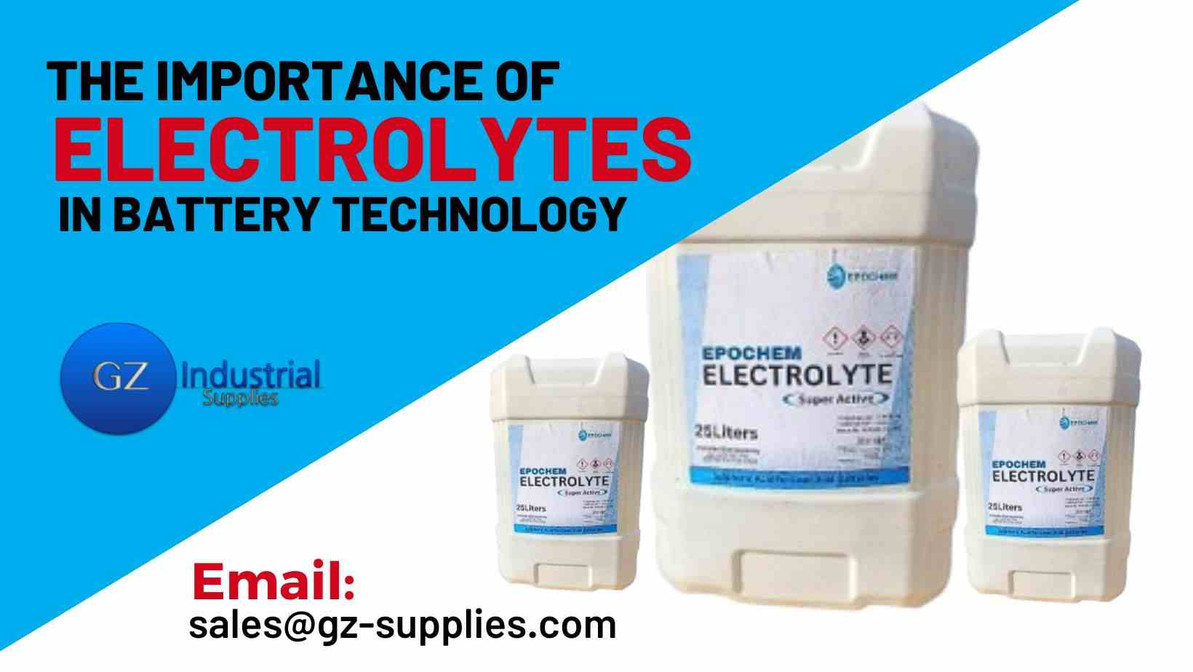The Importance Of Electrolytes In Battery Technology
Electrolytes are essential components of batteries, playing a crucial role in enabling the electrochemical reactions that generate electricity. They function as the medium for ion transport, facilitating the flow of ions between the positive and negative electrodes. Without electrolytes, batteries would cease to operate.
Epochem Electrolyte 25L 
Functions of Electrolytes in Batteries
Ion Transport: Electrolytes allow ions to move between the electrodes. During discharge, positive ions (cations) travel from the negative electrode to the positive electrode, while negative ions (anions) flow in the opposite direction.
Electrical Conductivity: Electrolytes must possess high electrical conductivity to allow for efficient ion movement. This conductivity ensures that the flow of current is not hindered by the electrolyte.
Chemical Reactions: Electrolytes participate in the chemical reactions that occur during battery discharge and charge. They provide the medium for the transfer of electrons between the electrodes.
Types of Electrolytes
There are various types of electrolytes used in batteries, including:
Liquid Electrolytes: These are typically aqueous solutions or organic solvents containing dissolved salts. Examples include sulfuric acid in lead-acid batteries and potassium hydroxide in alkaline batteries.
Solid Electrolytes: These are solid materials that allow ions to pass through them. They are used in solid-state batteries, which offer improved safety and higher energy density.
Gel Electrolytes: These are electrolytes that have been thickened with polymers to form a gel-like consistency. They are used in sealed lead-acid batteries, where they provide leak resistance.
Importance of Electrolyte Properties
The properties of electrolytes play a vital role in battery performance. Key characteristics include:
Conductivity:The higher the conductivity, the lower the resistance to ion flow, resulting in lower internal resistance and higher power output.
Stability: Electrolytes must be chemically and electrochemically stable under operating conditions to prevent degradation and extend battery life.
Viscosity: Viscosity affects the rate of ion transport. High viscosity can hinder ion movement, reducing battery efficiency.
Temperature Stability: Electrolytes should maintain their properties over a wide temperature range to ensure reliable battery operation in different environments.

Frequently Asked Questions About Electrolytes in Battery
What are the Two Chemicals found in Battery Electrolyte?
The electrolyte solution is typically comprised of 35% sulfuric acid and 65% water, and energy is produced when the sulfuric acid comes in contact with the lead plate and causes a chemical reaction.
How do you know if an Electrolyte is Strong or Weak?
Strong electrolytes ionize completely (100%), while weak electrolytes ionize only partially (usually on the order of 1–10%). That is, the principal species in solution for strong electrolytes are ions, while the principal species in solution for weak electrolytes is the un-ionized compound itself.
What is the cause of loss of Electrolyte in a Battery cell?
The loss of electrolyte in a flooded lead acid battery occurs through gassing as hydrogen escapes during charging and discharging. Venting causes the electrolyte to become more concentrated, and the balance must be restored by adding clean water.
Conclusion
Electrolytes are indispensable components of batteries, enabling the electrochemical reactions that produce electricity. Their properties have a significant impact on battery performance, including power output, efficiency, stability, and temperature tolerance. Understanding the role of electrolytes is essential for developing advanced battery technologies with improved energy storage capabilities.
Related Articles:
The Critical Role Of Electrolytes In Battery Operation
Recent Posts
-
Why Serious Mechanics Are Switching to Japanese-Made Shinano Air Tools
Japanese-Made Shinano Air Tools Key takeaway: Shinano’s tight-tolerance, twin-hammer designs d …Apr 24, 2025 -
Top 10 Hand Tool Brands for Professionals
Introduction When it comes to professional hand tools, quality, durability, and reliability are para …Apr 23, 2025 -
HOW DOES CORROSION INHIBITOR WORK
Introduction Corrosion has posed a lot of problems to various companies and industries; by interfer …Apr 22, 2025




